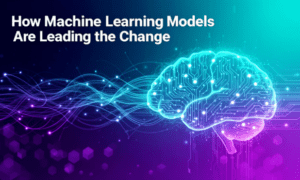Introduction
MarketsandMarkets reports that the global healthcare AI market has grown fast, rising from $4.9 billion in 2020 to $14.92 billion in 2023. It is expected to reach $164.16 billion by 2030. The healthcare industry is dealing with a huge amount of data nowadays, which requires advanced tools to process and analyze it effectively. There is also a rising demand for customized treatments for individual patients, and AI plays a big role in making this possible. Healthcare providers prefer AI to enhance their decision-making and improve healthcare results.
In this blog, we will discuss how these trends are transforming the healthcare industry and fueling AI’s rapid expansion in healthcare.
How Machine Learning Solutions are Transforming Healthcare?
Machine learning, a part of AI, is changing healthcare in multiple ways. It can quickly go through large amounts of data, such as medical records, images, and genetic details, to find insights people might overlook. This helps doctors make better choices and provide improved care for patients.
Important Applications of Machine Learning Solutions in Healthcare
Machine learning is revolutionizing healthcare by enabling innovative solutions that address critical challenges. Some of its most important applications include:
-
Predictive Analytics
Machine learning solutions help doctors and healthcare providers predict patient outcomes, spot people at higher risk, and take action sooner. For example, hospitals use it to determine which patients might return after being discharged so they can step in early and help patients stay healthy while spending less time in the hospital.
-
Precision Medicine
ML solutions create personalized treatments by analyzing data like genetics and lifestyle. This reduces trial-and-error and makes care more effective. For instance, ML helps identify the best cancer therapies based on a patient’s genetics.
-
Radiology and Imaging
ML assists radiologists by analyzing medical images like CT scans and X-rays. It detects issues like tumors or fractures early, improving diagnosis accuracy and patient outcomes.
-
Drug Discovery
ML speeds up drug development by predicting potential drugs and how they interact with the body, saving time and resources in creating life-saving medicines.
-
Patient Engagement
ML identifies patients who may not follow their treatments and helps providers take steps like sending reminders or offering support to improve outcomes.
-
Remote Monitoring
ML analyzes data from devices like fitness trackers to spot health issues early. In telemedicine, it organizes patient info, helping doctors provide fast, effective care.
Machine Learning Use Cases in Healthcare
Machine learning is changing healthcare by improving patient care in practical ways.
- IBM Watson for Oncology helps doctors diagnose and treat cancer. It analyzes a patient’s medical data, compares it with medical research, and suggests personalized treatments. This helps doctors make better choices and give better care to cancer patients.
- Google’s DeepMind uses machine learning to analyze eye scans and detect about 50 eye conditions. It’s highly accurate, similar to experienced eye doctors. Early catching of eye diseases can help prevent vision loss and improve the lives of millions worldwide.
Machine learning also helps doctors detect and treat sepsis, a serious medical condition. It lets doctors check patient data in real-time and catch early signs of sepsis much faster than older methods. When doctors spot these signs early, they can treat patients immediately, saving lives. This helps patients recover faster and reduces the pressure on hospitals, making it easier for them to care for more people.
These are just a few examples of how ML is already making a difference in healthcare, and as the technology continues to develop, its potential to improve patient care is going to grow.
The Future of Machine Learning in Healthcare
The potential of ML in healthcare is vast, and its future applications are both exciting and transformative. Here are some areas where ML is expected to make a significant impact:
-
Disease Prediction and Prevention
Advanced machine learning models use healthcare data to predict disease outbreaks. Governments and healthcare organizations can use this to plan ahead and send resources where needed, which helps save many lives during epidemics or pandemics.
-
AI-Driven Surgeries
Robotic surgeries backed by ML are precise and less invasive. These systems can assist surgeons by providing real-time insights, reducing errors, and improving patient recovery times. As the technology matures, more complex procedures will become feasible.
-
Chronic Disease Management
ML also helps patients manage chronic conditions like diabetes, heart disease, and hypertension. Wearable devices in the market are equipped with ML algorithms that provide continuous monitoring, alerting patients and caregivers to potential issues and suggesting lifestyle adjustments.
-
Healthcare Workflow Optimization
Hospitals and clinics use machine learning to simplify administrative tasks like scheduling, billing, and inventory management. This helps with costs and lets healthcare workers spend more time focusing on patient care.
-
Mental Health Support
ML-powered chatbots and virtual therapists are providing accessible mental health support. These tools look at what users share to give personalized advice, track mood changes, and even spot signs of mental health problems, encouraging people to seek professional help when necessary.
-
Genomic Research
ML is accelerating research in genomics by analyzing DNA sequences to identify genetic markers linked to diseases. This knowledge is instrumental in developing targeted therapies and advancing our understanding of human health.
Machine Learning in Healthcare Challenges
Despite its immense potential, the widespread adoption of ML in healthcare comes with challenges that must be addressed:
-
Data Privacy and Security
Healthcare data is highly sensitive, and protecting patient privacy is paramount. Robust security measures and regulatory compliance are essential to prevent data breaches and maintain trust.
-
Algorithmic Bias
Bias in training data can lead to unequal outcomes, disproportionately affecting certain groups. Ensuring diversity in datasets and regular algorithm audits can mitigate this risk.
-
Data Quality and Availability
ML models require large volumes of high-quality data to deliver accurate results. However, healthcare data is often fragmented and inconsistent. Standardizing data collection and sharing practices is critical for overcoming this hurdle.
-
Integration into Clinical Workflows
For ML tools to be effective, they must seamlessly integrate into existing healthcare workflows. This requires user-friendly interfaces and training for healthcare providers to ensure smooth adoption.
-
Regulatory and Ethical Considerations
The use of ML in healthcare raises ethical questions, such as accountability for algorithmic decisions. Clear guidelines and regulations are needed to address these concerns and ensure responsible use of the technology.
Conclusion
Machine learning is reshaping the healthcare landscape, offering innovative solutions to long-standing challenges. Its impact is profound and far-reaching, from improving diagnostics and treatment to enabling personalized care. However, realizing the full potential of ML requires addressing challenges such as data privacy, algorithmic bias, and integration into clinical workflows.
Are you looking for machine learning consulting services? At Maruti Techlabs, we offer advanced machine learning services and solutions to help enterprises address various business cases.
As the healthcare AI market grows, technology and healthcare professionals together can build a future where healthcare is more efficient, accurate, and focused on what patients need. Machine learning isn’t just a new technology; it’s changing how healthcare works.
Related Blogs
- https://marutitech.com/healthcare-software-development-services-importance/
- https://marutitech.com/predictive-analytics-in-healthcare-top-use-cases/





































